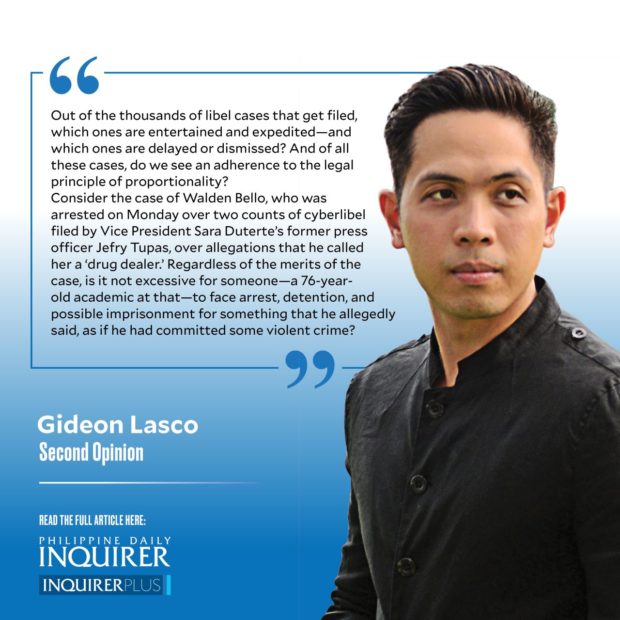Defenders of cyberlibel’s criminalization are swift to argue that its enabling law, Republic Act No. 10175, was tailor-made to address the realities of our digital age, when defamatory, malicious, and false claims can easily go viral and destroy people’s reputations.
They go on to point out that because a criminal conviction requires guilt beyond reasonable doubt, a high bar protects citizens from legal harassment filed by people in power—or with whom they simply have bad blood. They add that to protect individuals, there must be an imputation of malice, alongside the other elements of libel under the Revised Penal Code, namely, that the content must be defamatory, given publicity, and that the supposed victim must be identifiable. They also aver that this law, far from threatening freedom of speech, is actually a check to its abuse, given that, as the Court of Appeals (CA) declared, “the exercise of the right to free speech and of the press is not absolute.”
But laws do not exist in a blank space. They are enacted, interpreted, and enforced within a particular political context. Out of the thousands of libel cases that get filed, which ones are entertained and expedited—and which ones are delayed or dismissed? And of all these cases, do we see an adherence to the legal principle of proportionality?
Consider the case of Walden Bello, who was arrested on Monday over two counts of cyberlibel filed by Vice President Sara Duterte’s former press officer Jefry Tupas, over allegations that he called her a “drug dealer.” Regardless of the merits of the case, is it not excessive for someone—a 76-year-old academic at that—to face arrest, detention, and possible imprisonment for something that he allegedly said, as if he had committed some violent crime?
Consider also the case of Maria Ressa and Reynaldo Santos Jr., whose convictions were recently affirmed by the CA. The CA’s interpretation of the law will ultimately be for the Supreme Court to adjudicate, but does not the increased sentence of six years, eight months, and 20 days, and the 15-year statute of limitation, raise questions over the fairness of the law and its impact on our freedoms in what Ressa calls part of democracy’s “death by a thousand cuts”? As the United Nations Human Rights Committee declared, “imprisonment is never an appropriate penalty” for libel, precisely because of its unfairness and vulnerability to abuse.
Other examples illustrate how even ordinary citizens can be affected. For instance, the dozen cyberlibel complaints filed by supporters of Apollo Quiboloy over a Rappler investigative report speak of the ease with which one can take such actions; even the sociologist Jayeel Cornelio was included, even as his only role was to be interviewed.
In contrast—and further illustrative of the cyberlibel’s tiltedness—the President is immune from libel as part of his “absolute immunity from suit,” and lawmakers are likewise immune when they deliver their privilege speeches.
In fairness to our prosecutors and judges, many of them have applied the law judiciously, which is probably why very few libel cases have led to convictions, and which also likely is why all of the above mentioned cases against Cornelio and the Rappler journalists were summarily dismissed.
But the continued criminalization of libel and cyberlibel means that citizens face the risk of having to defend themselves before prosecutors and judges, with all the accompanying legal, financial, and emotional costs it entails. “You should take it as a compliment,” journalists and activists who face such cases are told, but to use the language of Justice Marvic Leonen, the sentiment that lingers is “[t]he chilling effect on various types of speech with just the possibility of criminal libel prosecution.”
It also means so much wasted time and effort on the part of our prosecutors and judges, further clogging our judicial processes. As Rappler’s Lian Buan recently reported, there is no clear end game for many of these cases, a vast majority of which remain “filed in court” or under “preliminary investigation.”
To be clear, I agree that there has to be some mechanism—particularly for private citizens—to seek redress when they face wildfire lies and false accusations, whether by government officials, other citizens, and, yes, the media. But the liability must be civil, not criminal. For indeed, the criminalization of libel and cyberlibel in our country has been used as a weapon against us—and we should not tolerate it.
—————–
glasco@inquirer.com.ph


